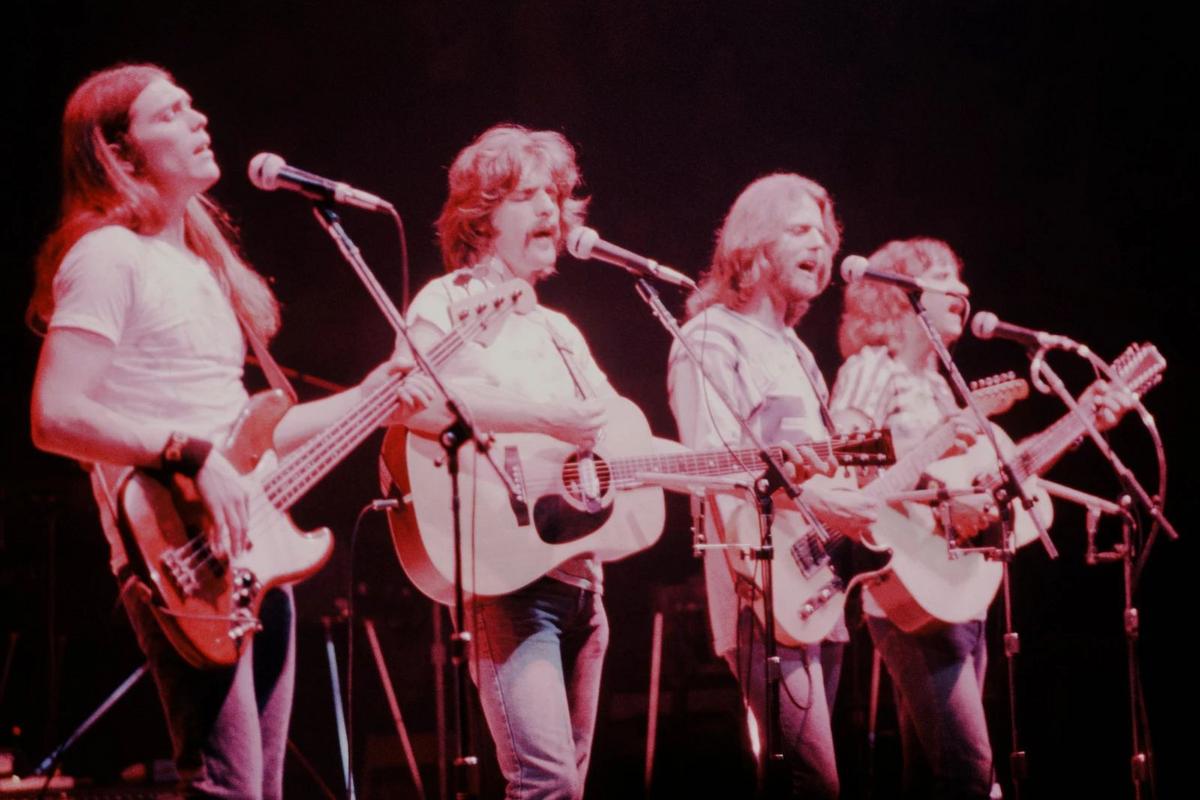Rising to No. 1 on the list of Eagles Top 40 singles is no easy task.
A total of 17 tracks made Billboard’s main chart, with all but one arriving in the initial era of 1972-1980 that sealed their Rock & Roll Hall of Fame status. (The lone exception was Don Henley‘s “Get Over It,” from the Eagles’ unlikely early ’90s reunion.)
They tell the story of a songwriting partnership that grew with each new studio album until Henley and Glenn Frey were the group’s acknowledged leaders. Lead vocals were pretty evenly split, with Henley on eight and Frey on six. Frey was the frontman on two chart-topping songs, while Henley had three. (Frey’s “Lyin’ Eyes” just missed at No. 2.)
READ MORE: Ranking Every Eagles Album
But their bandmates made key contributions along the way. Randy Meisner and his successor Timothy B. Schmit both sang their group into the Top 40 while everyone shared the mic for another charting favorite, “Seven Bridges Road.” Neither “Already Gone” nor “Life in the Fast Lane” would have became a hit without signature guitar contributions from Don Felder and Joe Walsh, respectively.
Classic-rock radio listeners might be surprised by what doesn’t appear on the following Eagles list, including 1972’s “Desperado,” 1973’s “Tequila Sunrise” and 1976’s “Victim of Love.” It’s not because they’re unworthy of inclusion.
After all, “Tequila Sunrise” has been played more than 176 million times on Spotify alone. “Victim of Love” added 49 million more listens. “Desperado” has a whopping 224 million streams on Spotify. Yet they never made the Top 40 upon original release: “Tequila Sunrise” only reached No. 64 on Billboard’s main chart. Despite earning significant radio airplay, “Desperado” and “Victim of Love” were never released as singles.
Here’s a look back at the band’s bonafide hits, with a ranking of all 17 Eagles Top 40 singles:
No. 17. “Get Over It”
Hot 100: #31
From: Hell Freezes Over (1994)
Seemingly prone to bad moods, Don Henley returned to Eagles with a glum song that draws out the worst of those tendencies. Even a scalding turn on the slide from Joe Walsh can’t get things back on track as Henley un-ironically calls out others for “all this bitching, moaning, pitching a fit.” Still, it had been almost 15 years since the Eagles had last released a single, so “Get Over It” reached the Top 40 anyway.
No. 16. “Please Come Home for Christmas”
Hot 100: #18
From: 1978 single
Sessions for the follow-up to Hotel California were dragging on, and executives at Asylum had grown concerned. Everybody needed a break. Henley suggested the recently reformulated Eagles cover an old Charles Brown song he remembered as a kid growing up in east Texas. “Please Come Home for Christmas” served as an official introduction to Timothy B. Schmit, who replaced Randy Meisner after the Eagles’ most recent tour completed. It also broke the creative logjam: They completed The Long Run mere months after this holiday song hit.
No. 15. “Seven Bridges Road”
Hot 100: #21
From: Eagles Live (1980)
The band’s gorgeous harmonies on “Seven Bridges Road” belied what was really going on behind the scenes. Recorded live just days before their breakup, this tribute to an old Alabama country route written by singer-songwriter Steve Young became the Eagles’ final charting single until an unlikely early-’90s reunion. The template for their work was a remarkably similar 1973 version by Iain Matthews that was produced by Mike Nesmith of the Monkees.
No. 14. “I Can’t Tell You Why”
Hot 100: #8
From: The Long Run (1979)
Poor Timothy B. Schmit. The first Eagles song to feature Meisner’s replacement was also the first to be completed for The Long Run. Then it became a very long run indeed, as sessions dragged on from March 1978 through September 1979. “I Can’t Tell You Why,” with one of Glenn Frey’s most expressive guitar solos, wasn’t released as the LP’s third single until February 1980. By July, Eagles were in the midst of a lengthy hiatus.
No. 13. “Peaceful Easy Feeling”
Hot 100: #22
From: Eagles (1972)
Eagles had been together just a little more than a week when Frey brought in this song from buddy Jack Tempchin. Written off and on while Tempchin was girl watching around his hometown of San Diego, the third single from their debut is brought to life through sunlit backing vocals from Bernie Leadon and Randy Meisner. Its timeless message about fate did the rest: “Part of the idea is when you give up looking for something, a lot of times that’s when you find it,” Tempchin told Culture Sonar. “Your looking was getting in the way.”
No. 12. “Witchy Woman”
Hot 100: #9
From: Eagles (1972)
Henley’s only songwriting credit on the Eagles’ first album arrived courtesy of a half-finished song Leadon had been working on since his days with the Flying Burrito Brothers. “[Leadon] came over one day and started playing this strange, minor-key riff that sounded sort of like a Hollywood movie version of Indian music — you know, the kind of stuff they play when the Indians ride up on the ridge while the wagon train passes below,” Henley later told Cameron Crowe. “It had a haunting quality, and I thought it was interesting, so we put a rough version of it down on a cassette tape.” Frey completed things with a standout guitar solo.
No. 11. “New Kid in Town”
Hot 100: #1
From: Hotel California (1976)
“New Kid in Town” returned to the issue of aging, but ended up revealing deeper worries surrounding the Eagles. “We were already chronicling our own demise,” Henley said in the liner notes to The Very Best Of. “We were basically saying, ‘Look, we know we’re red hot now, but we also know that somebody’s going to come along and replace us – both in music and in love.'” Frey and Henley helped complete an idea brought to the band by J.D. Souther. When they were finished, Eagles had their third chart-topping smash.
No. 10. “Life in the Fast Lane”
Hot 100: #11
From: Hotel California (1976)
Joe Walsh was fooling around with this riff in a loose rehearsal moment when the others took notice. Henley asked, “What the hell is that? We’ve got to figure out to make a song out of that.” Then, some time later, Frey was barreling down the Santa Monica highway with a drug dealer he called “the Count.” “I was riding shotgun in a Corvette on the way to a poker game. The next thing I knew we’re going about 90 miles an hour,” Frey later remembered. “I say, ‘Hey, man, what are you doing?’ And he looked at me and he grinned, and he goes, ‘Life in the fast lane!'” Released as the final single from Hotel California, the results shot to No. 11.
No. 9. “Lyin’ Eyes”
Hot 100: #2
From: One of These Nights (1975)
This crossover hit was written in a rush of inspiration over just two days. Yet, every element of this wry narrative about a gold digger’s empty life unfolds with a writerly knack for detail. Glenn Frey shifts points of view, never wasting a word, as he fills in the blanks around a real-life encounter he had while with Don Henley at their favorite ’70s-era watering hole, Dan Tana’s. They rushed back home, working to get every word just right before heading directly into the studio, where the Eagles displayed a similar meticulousness: The song’s deeply resonant opening line – “City girls just seem to find out early” – actually represents six different tries.
No. 8. “Already Gone”
Hot 100: #32
From: On the Border (1974)
You could partly blame “Locomotive Breath” for the Eagles’ split with Glyn Johns while recording this album. “We’re taking a beating opening for Jethro Tull,” Frey said in 1973: Rock at the Crossroads, “and our feeling was, ‘We gotta have some kick-ass songs.'” Eagles started with “Already Gone,” as the band and new producer Bill Szymczyk shifted to the Record Plant in Los Angeles. Newly added guitarist Don Felder then brought a sharp edge to the session. “The great thing for me about [“Already Gone”] is that I left England behind,” Frey told Cameron Crowe, “and had a much more positive energy in the studio.”
No. 7. “Heartache Tonight”
Hot 100: #1
From: The Long Run (1979)
This took forever to finish, like everything else on The Long Run. Frey’s initial inspiration was a straightforward love of old Sam Cooke records, played out as a loose jam with J.D. Souther. But then Frey got stuck. He ran it by Bob Seger, who’d originally taken Frey under his wing as a teen. Henley was involved, too. Together, they’d begun piecing together a fun-sounding Grammy winner. Something, however, was still missing. That’s when Seger blurted out the title line. “Heartache Tonight” went on to become the Eagles’ final No. 1 single.
No. 6. “The Long Run”
Not 100: #8
From: The Long Run (1979)
Eagles had scaled the mountain top, reaching an era-defining plateau with Hotel California. There was, really, nowhere to go but down. Still, as the title track from the band’s final classic-era album makes clear, they intended to go down swinging. “Disco had exploded, and punk was on the rise,” Henley told Rolling Stone in 2016. “We were beginning to see press articles about how we were passe. Those kind of jabs were part of the inspiration for the song The Long Run: Who is gonna make it? We’ll find out in the long run.'” Of course, the group promptly imploded. But their legacy only grew, eventually leading the Eagles back for an improbable ’90s-era reunion.
No. 5. “Best of My Love”
Hot 100: #1
From: On the Border (1974)
“Best of My Love” is remembered today as the Eagles’ breakthrough single, but there was a bit of controversy involved with reaching that goal. Seems the band’s label shortened the song for airplay — without clearing anything beforehand. It went from 4:34 on 1974’s On the Border to 3:25 on the AM radio edit, while becoming the first of five ’70s-era chart-toppers for the Eagles. That so infuriated everyone that the band came up with an ingenious plan, hacking a piece out of a 45 single covered in gold paint then presenting it to the bosses at the Asylum Records offices. Message received.
No. 4. “Take It to the Limit”
Hot 100: #4
From: One of These Nights (1975)
As this became Eagles’ highest charting single yet, Randy Meisner found himself under crushing pressure to hit the song’s heart-rending high note onstage every night. Panic apparently began to creep in, and he asked that the song – despite its massive popularity – be removed from the set. When the rest of the Eagles refused, Meisner quit. The vocal was first taken over by Glenn Frey, then after Frey’s death, by Vince Gill.
No. 3. “One of These Nights”
Hot 100: #1
From: One of These Nights (1975)
The goal was to break the ballad template, stirring in contemporary R&B sounds and a sneaky lyric that pulls no punches. Everything was coming together for Frey and Henley, who were quickly emerging as the group’s undisputed co-leaders. Still, Felder played a huge role in helping the Eagles shed their country-rock pretensions. He arranged the unforgettable bass and guitar signature for “One of These Nights,” and his searing solo then neatly underscores this chart-topping song’s bitter sense of missed opportunities.
No. 2. “Take It Easy”
Hot 100: #12
From: Eagles (1972)
The opening track on the Eagles’ first album perfectly sums up their early country-rock aesthetic, so much so that Glenn Frey said its first few jangly guitar strums “felt like an announcement, ‘And now … the Eagles.'” The impetus for “Take It Easy,” however, came from elsewhere: Jackson Browne, a then-unknown singer-songwriter who lived next door to Frey, couldn’t finish a new song. “Take It Easy” kept stopping cold on the second verse after “Well, I’m a-standin’ on a corner in Winslow, Arizona.” Then Frey had an idea. Today, you’ll find a statue commemorating the next line in Winslow, paired with a painting of a girl in a flatbed Ford.
No. 1. “Hotel California”
Hot 100: #1
From: Hotel California (1976)
Turns out this song’s off-the-cuff brilliance wasn’t so off-the-cuff, after all. The concluding twin-guitar solo on “Hotel California” has moved into classic-rock lore, representing the most famous in a series of fiery collaborations between Don Felder and recently installed new member Joe Walsh. But it wasn’t improvised at all. Instead, the completed Eagles song mirrors — almost note for note, at Henley’s insistence — the original instrumental demo that Felder created in his Los Angeles home. A call to Felder’s housekeeper led to a frantic search through all of his cassettes. She then put the found tape into a boombox and played it through the phone so Walsh and Felder could learn the original twin solos.
Listen to Don Felder on the ‘UCR Podcast’



